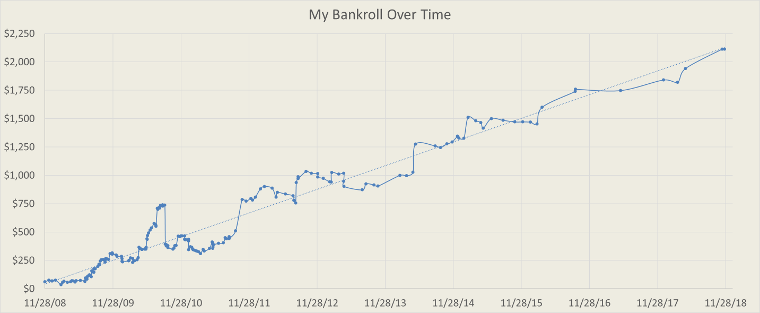Ten years ago, I bought into a No-Limit Texas Hold’em poker game for $10. I won $72.50. Using those winnings, I bought into another such game, and so on. Ten years and nearly 200 games later, I’ve grown that initial $10 to $2,114. Here’s a chart showing my “bankroll” (money set aside exclusively to play poker) over time:

Not bad percentage-wise, but not a huge deal either. At least, not financially.
The bigger deal has been the life lessons I’ve learned or had reinforced along the way—lessons dealing with time, money, and what matters most.
In this three-part series, I’ll share 8 lessons a decade of No-Limit Texas Hold’em has taught me. If you like poker, I hope you enjoy. But whether you like poker or not, hopefully you’ll find these lessons applicable to your life as well:
Lessons 1-3
1. Patience
Successful poker players typically play the hand they are dealt at most one out of three times. Two-thirds of the time, they fold. Weak players, by contrast, often play the hand they are dealt much more often.
I get that it’s no fun not to be involved in the action. But if you want to win, you have to choose your spots more intentionally. And that requires patience.
In a day and age when everything is “on demand,” patience is tough to come by. Two days is starting to feel like a long time to wait for Amazon to deliver. (Which Amazon knows, hence “Prime Now.”)
But what is rare is valuable. And that holds for patience, too. And not just at the poker table.
As just one real-life example, I’ve known businessmen who can’t seem to say no to a deal or new idea. They frenetically chase every opportunity.
But to achieve what you want, you don’t need to jump at every opportunity. In fact, you shouldn’t. Rather, you should be patient: conserve your time/money/energy for opportunities with real promise.
2. “Luck” Favors the Bold
While it’s important to be patient in poker, it’s also important not to be passive. You have to act when the moment calls for it. Active—even aggressive—players fare much better than passive ones.
It is typically better to bet or raise rather than check or call. When you check or call, you only have one way to win: by having the best hand. When you bet or raise, by contrast, you can win in either of two ways: by having the best hand or by inducing your opponent to fold the best hand.
Toward the end of tournaments, this principle rises considerably in importance. The blinds and antes (money players must commit to the pot before the hand is dealt) become an increasingly large portion of your chip stack. When that’s the case, it’s far better to push all-in even with poor cards than it is to get “blinded out” (to go down without a fight).
In “real life,” too, it’s better to be active than passive. It’s better to have that hard conversation with a friend or family member rather than wait to see if things work out. It’s better to ask for a raise than hope one is offered. It is better to pursue a dream than ignore it.
It’s easy to drift through life, taking what comes. But it’s better to be an agent in your destiny.
3. Perseverance
On one occasion, my bankroll was down 58% from its previous high. That hurt, especially as I wanted to be able to play in games with bigger buy-ins, and I wanted to do so using only the money from my prior winnings.
On two occasions, my bankroll was down from its previous high for more than a year. That actually hurt worse. To slog away for more than a year with no apparent progress obviously made me question my ability.
At such times it would have been easy to throw in the towel.
But if you’re passionate about something and want to succeed, you have to persevere through difficulty. In her 2016 bestseller Grit, Angela Duckworth goes to some lengths to prove that the single biggest key to success is “grit”—passion and sustained persistence applied toward long-term achievement.
Think of your greatest accomplishments in life. Whether they relate to athletics, academics, career, family, faith, or otherwise, I have no doubt they involved persevering—probably for a long time in some cases—through difficulty. That’s worth reflecting on and recalling the next time you encounter difficulty in a current pursuit.
Conclusion
10 years of playing poker have taught me a number of lessons that are as applicable to life as they are to cards.
One is the value of being patient. In life as well as in poker, you should conserve your time/money/energy for opportunities with real promise.
A second is not to be passive. It’s good to be patient. But when the moment’s right, you have to act.
Thirdly, you will experience droughts and other difficulties in poker, same as in any pursuit. The temptation to quit is strong in those situations. But if you want to succeed, you have to persevere.
In my next post in this series, I’ll share two lessons that have to do with the emotional aspects of poker and of life. And I’ll tell the story of my single worst day at the tables. . . .
Question: Do you play poker? If so, what life lessons has it taught you? You can leave a comment by clicking here.
If you liked this post, why not join the 5,000+ subscribers who receive blog updates on how to have more time and money for what matters most? Sign up here.

It’s good to have read something nice about playing poker despite having the initial thought that it’s just another gambling game. I like it when you said that this game favors the bold and that is not just based on pure luck. I guess I’ll ask my sister to join me playing this game in a nearby place where we can compete to each other and get to know our skills when it comes to strategy in acing such game.